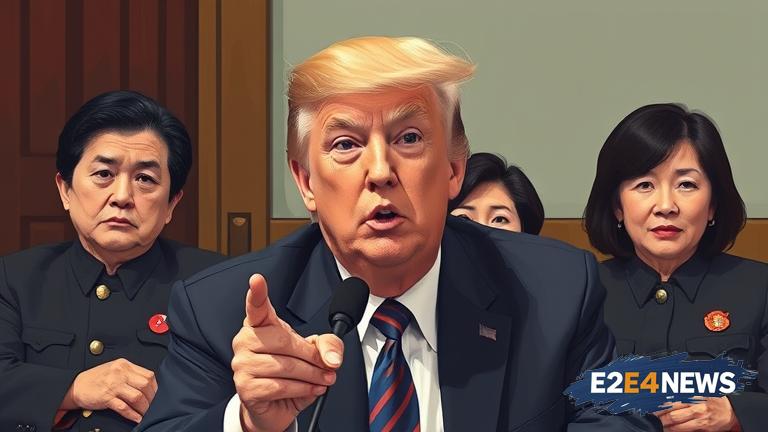The comfort women issue has long been a contentious topic between South Korea and Japan, with the former demanding acknowledgment and reparations for the thousands of women forced into sexual slavery during World War II. Recently, US President Donald Trump waded into the fray, sparking outrage and concern from South Korean officials and citizens alike. Trump’s comments, which were perceived as dismissive and insensitive, have been widely criticized for downplaying the severity of the issue. The US President’s remarks have also been seen as a departure from previous administrations, which have generally taken a more nuanced and empathetic approach to the comfort women issue. South Korea’s government has been quick to respond, with officials expressing disappointment and frustration over Trump’s comments. The country’s foreign ministry has also issued a statement calling for Japan to take responsibility for its actions during World War II. The comfort women issue is a highly sensitive topic in South Korea, where it is seen as a matter of national pride and historical justice. Many Koreans feel that Japan has not adequately acknowledged or atoned for its wartime atrocities, and that the country continues to gloss over its role in the forced recruitment of comfort women. The issue has also become a major point of contention in South Korea’s relations with Japan, with the two countries engaging in a series of diplomatic spats and trade disputes in recent years. Despite the challenges, South Korea remains committed to seeking justice and recognition for the comfort women, with many activists and survivors continuing to push for greater awareness and accountability. The US has traditionally played a key role in mediating relations between South Korea and Japan, and Trump’s comments have raised concerns about the country’s ability to navigate this complex and sensitive issue. As the controversy continues to unfold, it remains to be seen how the US will balance its relationships with South Korea and Japan, while also addressing the historical injustices of the comfort women issue. The incident has also sparked a wider debate about the role of the US in promoting human rights and historical justice, with many critics arguing that Trump’s comments have undermined American credibility on these issues. In response to the backlash, the US State Department has sought to clarify Trump’s comments, emphasizing the country’s commitment to human rights and its support for the comfort women. However, the damage may already be done, with many in South Korea and beyond questioning the US President’s judgment and sensitivity on this critical issue. The comfort women issue is a powerful reminder of the ongoing legacies of historical trauma and the importance of acknowledging and addressing past injustices. As the world continues to grapple with the challenges of historical justice and human rights, the US and other countries must be mindful of the need for empathy, understanding, and accountability. The incident has also highlighted the importance of education and awareness in promoting greater understanding of the comfort women issue, with many calling for increased efforts to teach this history in schools and universities. Furthermore, the controversy has sparked a renewed focus on the need for Japan to take responsibility for its actions during World War II, with many arguing that the country must do more to acknowledge and atone for its wartime atrocities. In the end, the comfort women issue is a complex and multifaceted problem that requires a nuanced and empathetic approach, one that prioritizes the needs and dignity of the survivors and their families. As the US and other countries navigate this sensitive issue, they must be guided by a commitment to human rights, historical justice, and the principles of dignity and respect. The incident has also raised questions about the role of social media and online platforms in shaping public discourse and promoting awareness of historical injustices. Many have taken to social media to express their outrage and disappointment over Trump’s comments, using hashtags and online campaigns to raise awareness and mobilize support for the comfort women. The use of social media has also highlighted the importance of online activism and advocacy in promoting historical justice and human rights, with many arguing that these platforms can play a critical role in amplifying marginalized voices and promoting greater awareness of social and historical injustices. Ultimately, the comfort women issue is a powerful reminder of the need for ongoing activism and advocacy in promoting historical justice and human rights, and the importance of prioritizing the needs and dignity of survivors and their families.
